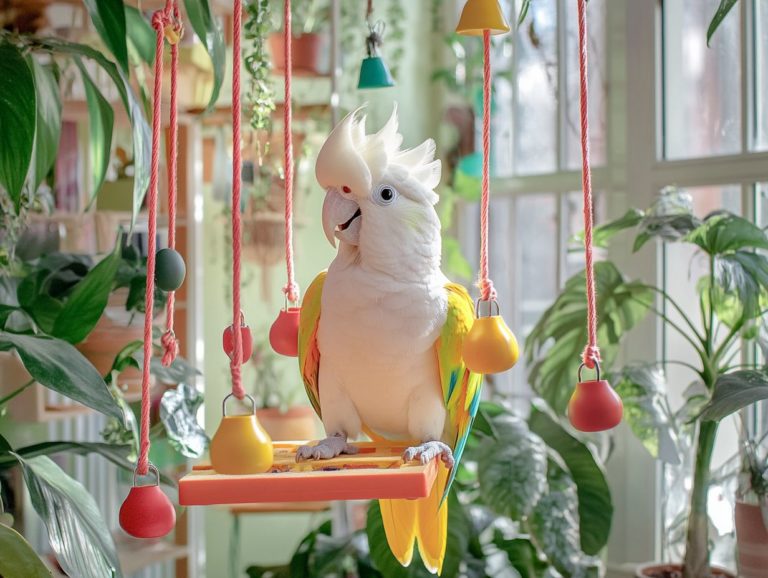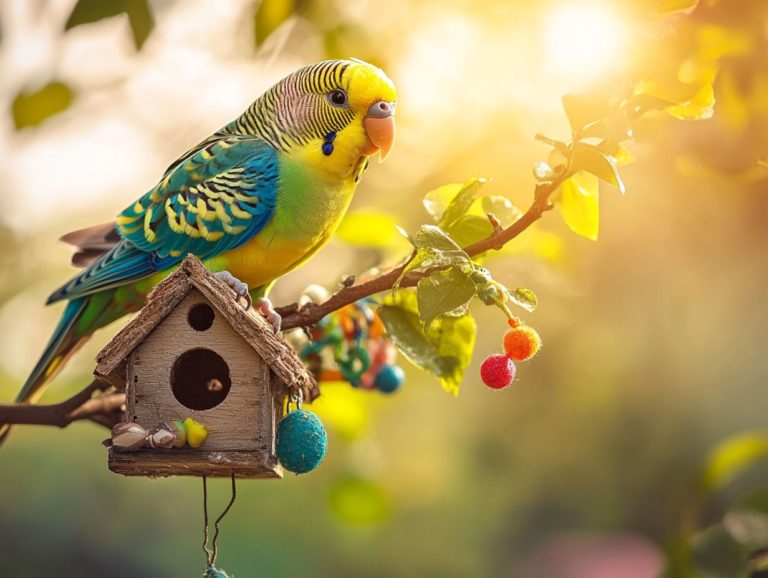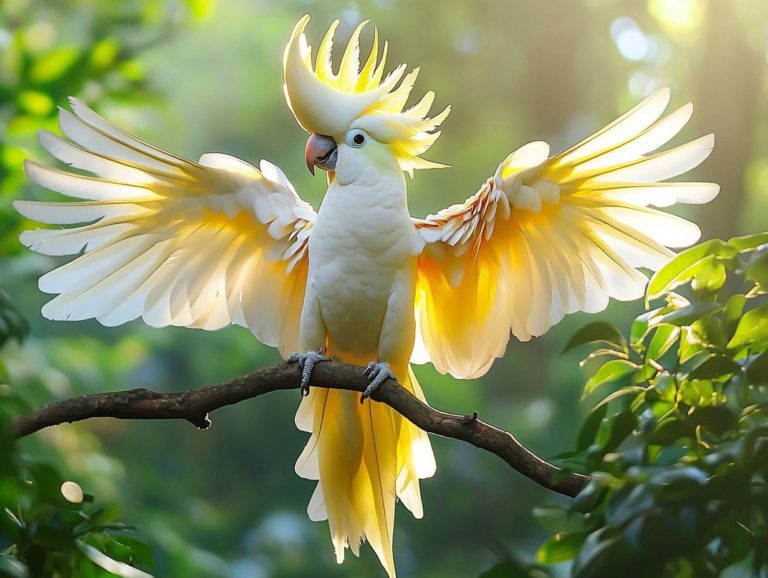Caring for Special Needs Parrots: A Guide
Caring for special needs parrots is not just a responsibility; it s an enriching journey that demands your understanding, patience, and unwavering dedication to their unique needs.
These extraordinary birds can encounter various challenges, from physical disabilities to behavioral issues. Each requires personalized care and attention, including tailored modifications in their living space. Get ready to explore the common special needs of parrots, insights on creating a nurturing environment, and the significance of specialized care and training.
Discover how to cultivate a deep, loving bond with your one-of-a-kind feathered companion, fostering emotional support and trust.
Contents
- Key Takeaways:
- Caring for Special Needs Parrots
- Common Special Needs in Parrots
- Behavioral Issues
- Creating the Perfect Environment
- Specialized Care and Training
- How to Provide Emotional Support
- Frequently Asked Questions
- What defines a special needs parrot?
- What are some common challenges when caring for special needs parrots?
- Can special needs parrots still live a happy and fulfilling life?
- What should I consider before adopting a special needs parrot?
- How can I make my home more suitable for a special needs parrot?
- Are there any resources available for caring for special needs parrots?
Key Takeaways:
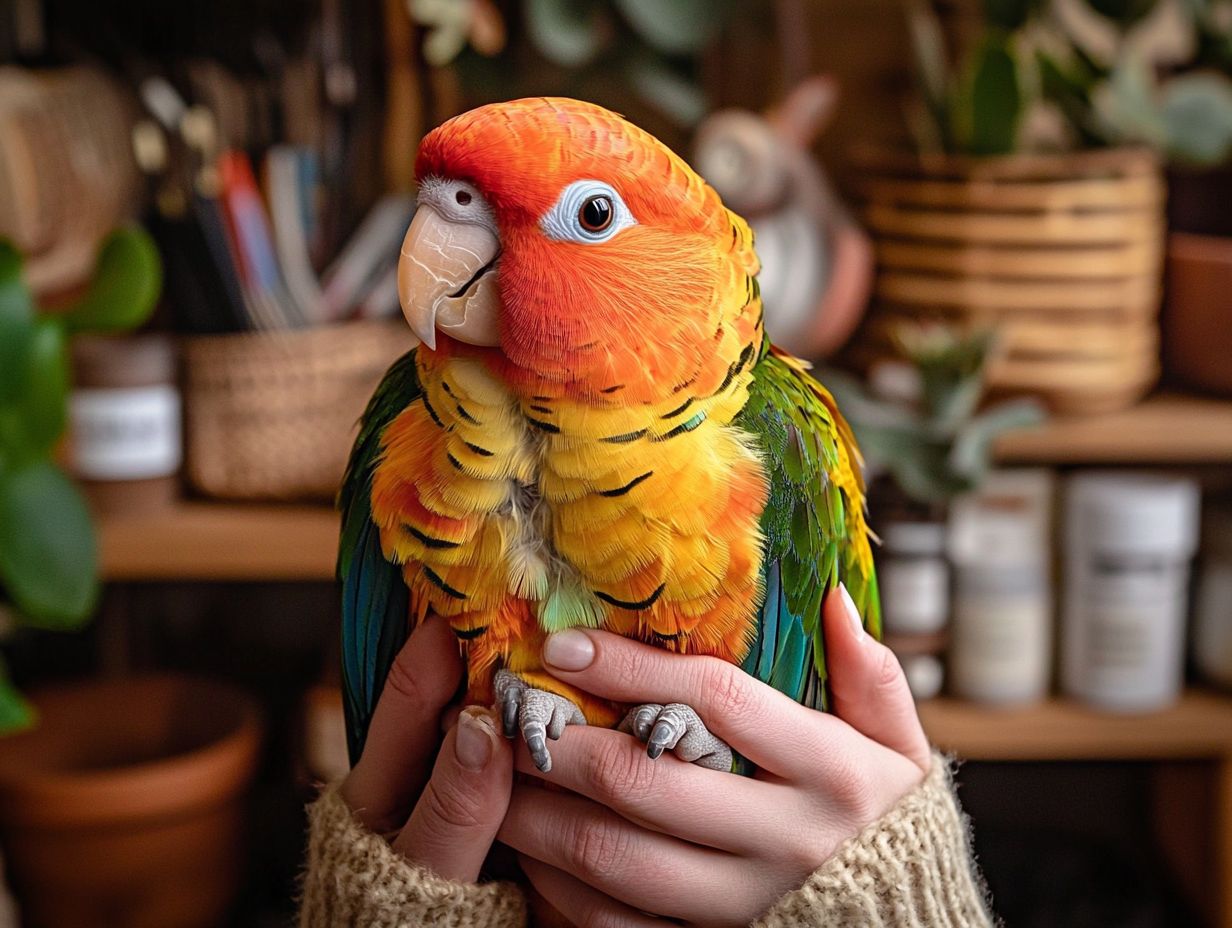
- Special needs parrots require extra care and attention to thrive in their environment.
- Physical disabilities and behavioral issues are common among special needs parrots and must be addressed accordingly.
- Working with a veterinarian and implementing specialized training techniques can improve the overall well-being of special needs parrots, ensuring their health and happiness.
Caring for Special Needs Parrots
Caring for special needs parrots is a significant commitment. It demands a deep understanding of their unique requirements, including their social nature and sensory reliance. For more insights, refer to this quick guide on caring for your lovebird.
These remarkable birds may experience physical disabilities, such as blind parrots or injuries. They need tailored care to adapt their environments for comfort and safety.
As a caregiver, you play a vital role in offering emotional support and ensuring their health through proper nutrition. It’s important to make essential modifications to their living spaces for their overall well-being.
This includes consistent monitoring, regular health examinations, and cultivating a nurturing atmosphere that fosters trust and resilience.
You must also be ready to address any behavioral issues that may arise, such as feather-plucking or trust issues, due to their conditions. This underscores the importance of specialized care.
Understanding Special Needs Parrots
Understanding special needs parrots is essential for providing effective care and companionship. For those looking to adopt, knowing the essential care for adopted parrots is crucial, as these birds often exhibit unique behaviors and emotional dependencies rooted in their past experiences.
Their distinctive characteristics may include heightened anxiety, specific social needs, or particular dietary requirements, often influenced by past traumas or their unique personalities.
Your role in addressing these idiosyncrasies is vital. Through consistent routines and gentle interactions, you can help establish a reassuring sense of security.
Building trust is crucial; the relationship thrives on open communication whether expressed through sounds they make, body language, or simply your presence. This reinforces the emotional bond between you and your parrot.
Recognizing signs of stress and responding with patience fosters a deeper bond, allowing these parrots to thrive emotionally and socially within a nurturing environment.
Common Special Needs in Parrots
Common special needs in parrots can present themselves in diverse ways, including physical disabilities and behavioral challenges. For specific insights, including essential care guidelines for adopted cockatoos, both require careful attention and thoughtful adjustments.
Each of these needs requires a customized approach to care, ensuring that their health and well-being are effectively supported.
Physical Disabilities
Physical disabilities in parrots, like blindness or injuries, call for specific adjustments in their environment to ensure safety and comfort.
It’s essential for you to understand the unique challenges these remarkable birds face, such as their need for emotional support, to truly support their well-being.
For example, if you have a parrot with limited mobility, providing perches at different heights or soft surfaces can make navigation easier. This helps eliminate the fear of falling, enhancing their comfort and safety.
Blind parrots thrive on auditory cues and familiar sounds, which assist them in orienting themselves within their surroundings.
You can further enhance their living space by minimizing sharp edges and opting for non-toxic materials and colorful toys. This effectively prevents injuries and provides enrichment.
By thoughtfully considering the unique needs of each parrot, you can create a nurturing environment that allows these extraordinary creatures to flourish despite their physical limitations.
Behavioral Issues
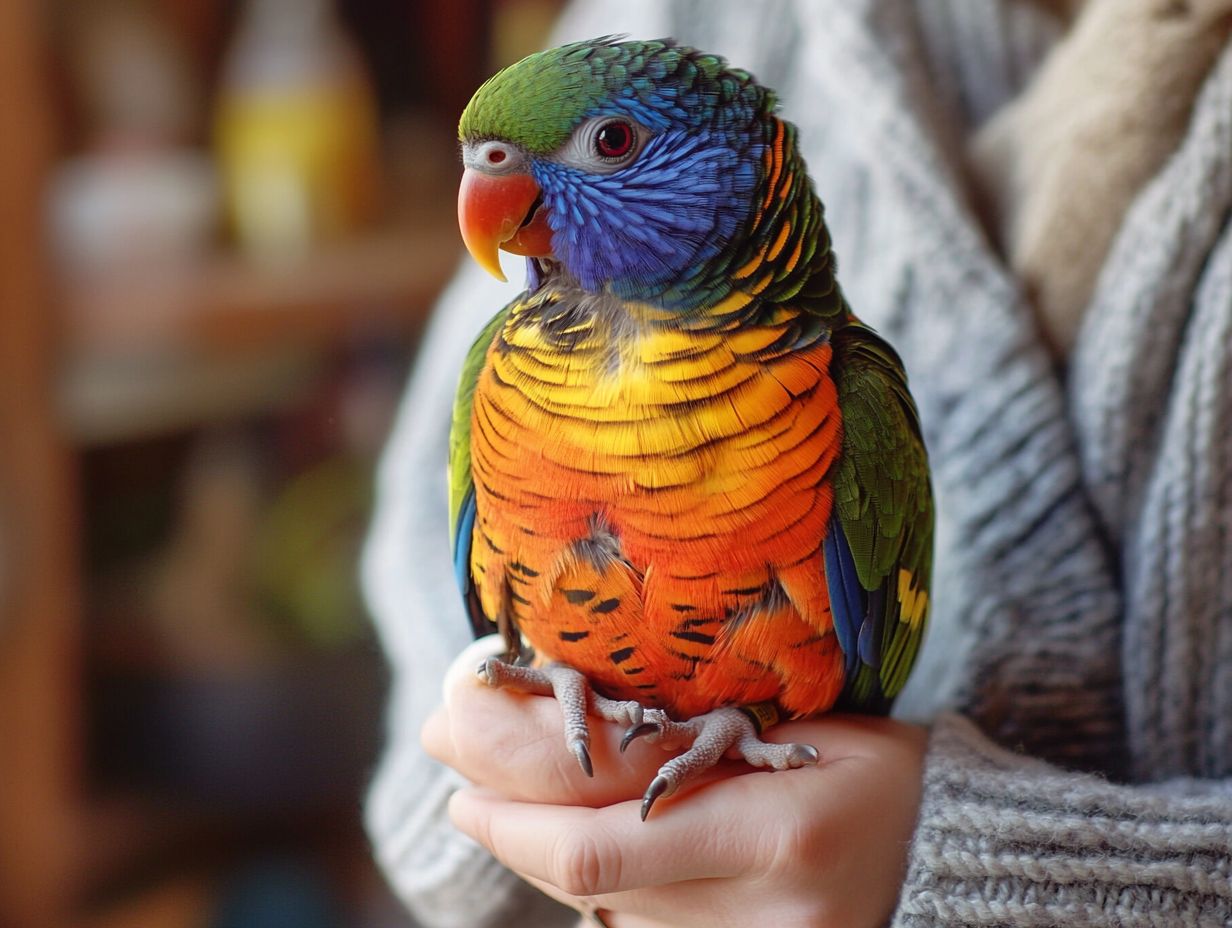
Behavioral issues in parrots can stem from various factors, including emotional stress, trust issues, and their sensory dependence on the environment. These factors may be affected by previous experiences.
These challenges can manifest as distressing behaviors, such as feather-plucking, which often signals deeper psychological struggles. For you as a caregiver, recognizing these signs is essential.
Creating a safe and stable environment fosters trust and alleviates anxiety, promoting an atmosphere where emotional support can thrive. Engage your parrot in interactive activities, provide enrichment tools, and use rewarding good behavior with treats or praise to significantly boost their confidence.
Establishing a consistent routine and dedicating quality time together nurtures a bond that enhances their emotional well-being. This is particularly important for special needs birds who require more attention. Ultimately, addressing these behavioral concerns requires a compassionate approach, balancing empathy with effective training strategies.
Creating the Perfect Environment
Creating the perfect environment for your parrot can transform their life! It is essential for their comfort and safety, profoundly influencing their mental health, health, and overall quality of life.
Your attention to detail in their surroundings can make all the difference in creating a nurturing space that supports their unique needs.
Making Life Easier for Your Parrot
Accommodating physical disabilities in your parrots involves making specific modifications. For example, create a secure cage environment to ensure their safety and ease of navigation within their living space.
Consider creating wider perches that offer stable footing and using softer materials. Incorporate sensory toys to minimize slip hazards and provide stimulation. Strategically place food and water containers at accessible heights so your birds can easily reach their essentials without strain.
If your parrots struggle with mobility, incorporating ramps can facilitate smoother transitions and enhance their overall comfort.
You’ll also want to adapt your cleaning protocols to keep surfaces hygienic and safe without disrupting their routine. Use non-toxic, easy-to-clean materials and regularly check for any potential hazards.
Providing toys designed for various abilities not only encourages mental stimulation but also promotes physical engagement, significantly enhancing their overall well-being and emotional balance.
Addressing Behavioral Needs
Addressing the behavioral needs of special needs parrots is crucial for fostering emotional support and building trust, especially for those with previous rescue experiences.
Understanding these needs requires a multifaceted approach. Use effective training techniques, particularly positive reinforcement methods, to bolster trust and communication. These practices help establish a strong, nurturing bond, essential for the long-term care of your parrot. Prioritize creating an enriching environment filled with diverse stimuli think toys and social interactions to promote mental engagement.
The more stimulating their surroundings, the more likely these parrots are to thrive both emotionally and behaviorally. Providing consistent emotional support, especially during transitions or stressful moments, is vital for their overall well-being, aiding in their behavioral adjustments.
Specialized Care and Training
Specialized care and training are essential for ensuring that special needs parrots thrive. This journey requires you to dive deep into their unique needs and fosters effective communication with caregivers and veterinarians, especially when considering how to handle a sick bird.
By prioritizing these elements, you can create an environment where these remarkable birds flourish.
Working with a Veterinarian
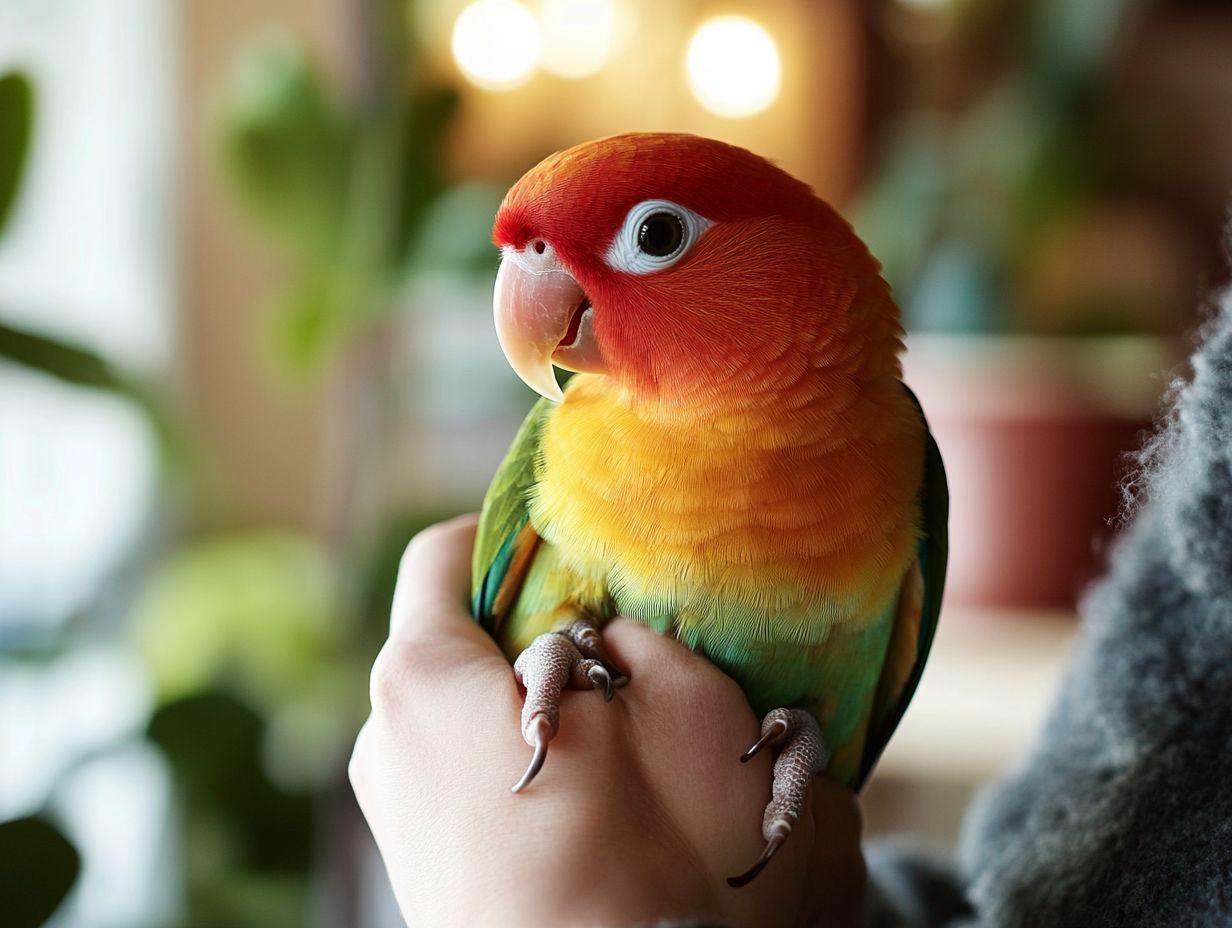
Working with a bird veterinarian is crucial for the happiness and health of special needs parrots. These remarkable birds require regular health examinations, dietary adjustments, and ongoing monitoring tailored to their unique conditions.
Building a strong relationship with a bird veterinarian guarantees that your feathered companions receive the appropriate medical care. It also creates a trusting environment where you can discuss your concerns openly. The veterinarian plays a crucial role in evaluating your parrot s specific needs, adjusting care plans as necessary, and offering advice that addresses the unique challenges faced by disabled or ill birds.
Their expertise in routine health checks allows for the early identification of potential issues. They can also guide you on proper nutrition the food that keeps your parrot healthy and habitat enrichment. This ensures a comprehensive approach to your parrot’s well-being and overall health.
Training Techniques for Special Needs Parrots
Training techniques for special needs parrots should emphasize fostering communication, enhancing their navigational skills, and promoting physical exercise, all while considering their unique behavioral needs.
By integrating interactive activities and engaging toys, you can cultivate a stimulating environment that encourages these birds to express themselves. This provides enrichment while they acquire essential skills. Establishing a consistent routine that incorporates verbal cues, gestures, and positive reinforcement techniques is crucial. This reinforces desired behaviors and significantly enhances their comprehension and responsiveness during training.
Incorporating short training sessions throughout the day not only builds trust and strengthens your relationship, but also helps the parrots adapt to their unique needs and keeps them physically active. Utilize positive reinforcement, such as treats or praise, to motivate and reward their progress, thereby reinforcing the vital bond necessary for effective learning.
How to Provide Emotional Support
Providing emotional support is essential when caring for special needs parrots, such as a blind parrot or one with a physical disability. This nurturing approach fosters a strong bond between the bird and its caregiver. For those caring for macaws, following essential care guidelines can create a foundation of trust and companionship that enriches both their lives.
Building Trust and Bonding with Your Parrot
Building trust and forming a bond with your parrot is vital for providing effective emotional support, especially for those with special needs and trust issues.
Creating a nurturing environment helps your parrot feel safe and valued, especially in their living space. This journey involves meaningful interactions that encourage your feathered friend to rely on you as a companion. Establishing regular routines, using gentle vocalizations, and applying positive reinforcement can invite your parrot to engage more openly.
Incorporating playtime or offering favorite toys can strengthen your connection while providing necessary enrichment. As you share these experiences, you lay a solid foundation for trust, allowing your parrot to more freely express its feelings and alleviating any anxiety related to its special needs, which may include behavior challenges or psychological well-being issues.
Frequently Asked Questions
What defines a special needs parrot?
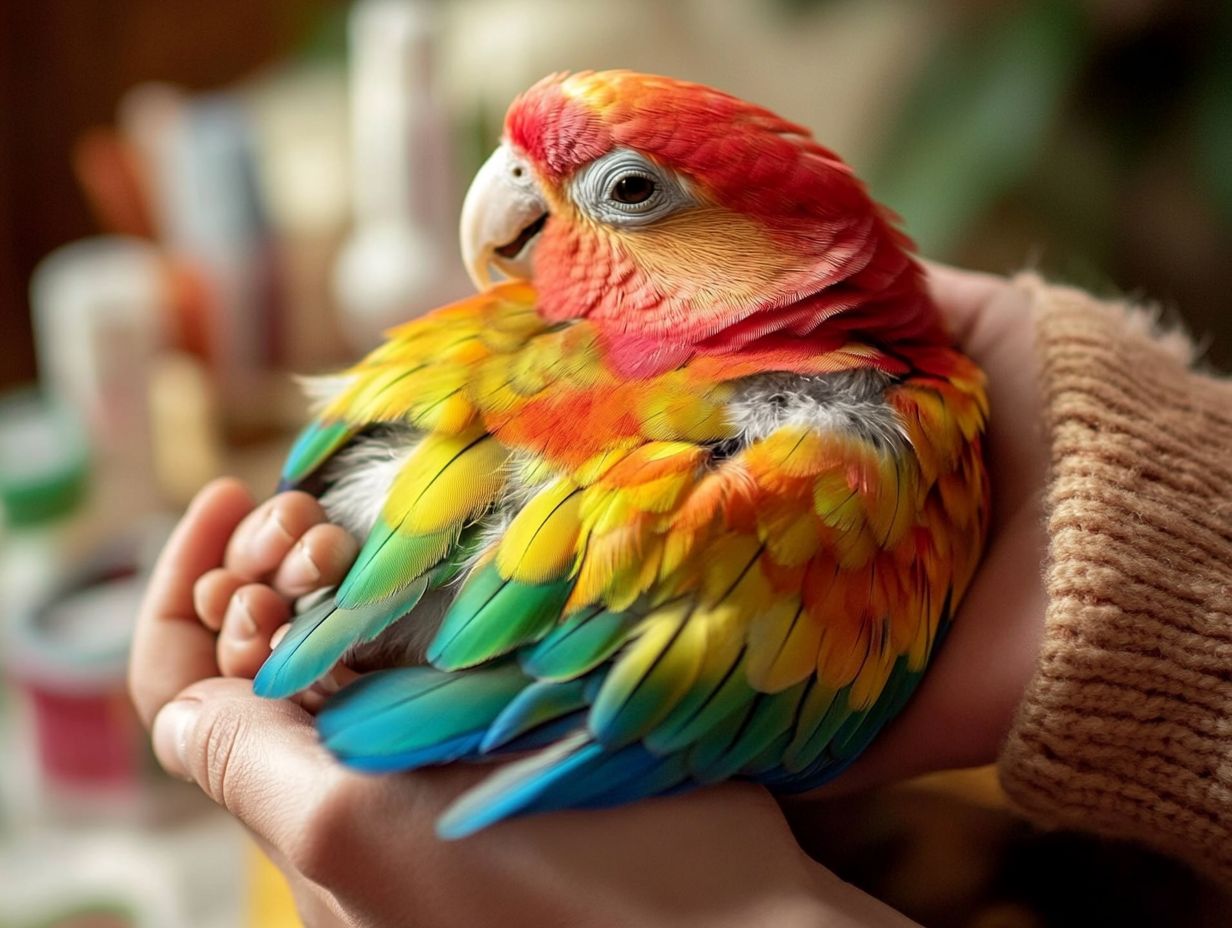
A special needs parrot is one that requires extra attention and specific care due to a physical disability or behavioral disability. This can include parrots with missing limbs, chronic health conditions, or behavioral issues such as feather-plucking.
What are some common challenges when caring for special needs parrots?
Some common challenges when caring for special needs parrots include managing their medical needs, providing a suitable environment, and addressing any behavioral issues they may have. For more insights, check out this guide on quaker parrot care tips, which may help with issues like trust or navigation difficulties.
Can special needs parrots still live a happy and fulfilling life?
Yes, special needs parrots can enjoy a happy life with the right care. Many parrots, like African greys and cockatiels, adapt well and engage joyfully with their owners.
What should I consider before adopting a special needs parrot?
Consider whether you can meet their specific needs. This includes providing for veterinary care and having the time to train them.
How can I make my home more suitable for a special needs parrot?
Make some changes, like adding ramps or perches for easier movement. Ensure their living space is secure and accessible.
Create a safe environment where they can thrive. Proper cleaning and navigation aids are essential.
Are there any resources available for caring for special needs parrots?
Yes, many resources are available. Consult a bird doctor for expert advice, join online parrot owner groups, and look for reputable rescue organizations.


